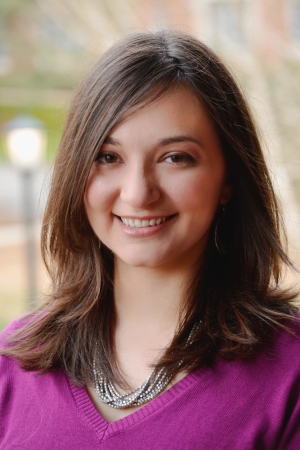
- About
- Consultation
- Programs
- Resources
- News & Events
Back to Top Nav
Back to Top Nav
Back to Top Nav
On a warm fall day, a group of faculty, staff, and postdocs gathered for a workshop in the sunny lounge of Fahey. Dr. Alyssa Hadley Dunn read out the instructions for a reflective activity meant as an example of something faculty can do in their courses with students. The workshop participants thoughtfully worked through the activities and engaged in discussion with their colleagues.
Dunn's session focused on a concept she developed called Teaching on Days After, an approach to instruction following days after impactful local, national, and international events, such as a presidential election or ongoing international conflicts. Dunn emphasized her research findings, which show that the current generation of students, who grew up engaging in lockdowns and for whom the pandemic hit during a pivotal period of development, generally want their instructors to address the events happening around them.
Yet, Dunn acknowledged the reality that instructors may feel unprepared or unsure about how to address controversial or emotionally sensitive topics in their courses. She encourages instructors to imagine the promise of addressing the event. What is the best thing that could come out of acknowledging it? The faculty and staff in the room listed the potential for humanizing ourselves and students, building community, and creating dialogue. Addressing days after, Dunn stated, is a type of harm reduction. She offered the following tips for instructors:
Dunn reminds us that students are not looking for expertise about a particular crisis or challenge on days after. They're looking for our humanity.
One activity Dunn led the group through was a grounding exercise called "Head, Heart, and Conscience." In her slides, she provided the following sample language for instructors to use in their courses. This activity takes approximately 10 minutes to complete.
Introduction to the activity: [Modify this wording to feel authentic to your voice.] Sometimes when something "big" happens in the world, it's hard to figure out what we feel and how to make sense of those feelings. This activity is designed to give us time to process together and ground us for further discussion. In your journals/laptops, write about what you're feeling in your head, heart, and conscience right now. This will only be for you, unless you'd like to share with me or the group later. Don't feel like you need to respond to all the prompts, and since I always get this question, you don't have to write in complete sentences. You could also take an alternative approach and craft your response multi-modally, meaning this could end up as a free form poem about your head, heart, and conscience; you could use it to create a drawing or other artifact.
[Between each section, allow 1-2 minutes for students to reflect and write]
Head: What information do you know about this event? What information is confirmed? What remains uncertain? Are there any facts that are contested? What additional information would you like to have to help you understand the event better?
Heart: What emotions does this event raise for you? Are there particular moments, images, or stories that stand out to you? If so, why?
Conscience: What questions about fairness, equity, or justice does this event raise for you? What choices did key figures make, and what values may have guided those choices? How were people impacted by this event? Are there people who should be held accountable? If so, how?
Once learners have completed this exercise, you can offer them time to discuss their reflections in groups or encourage them to discuss after class. Base your decision on your level of comfort, your class dynamic, the amount of time you have available, and other personal factors.
If you are interested in reading more about strategies for navigating challenging topics in your classroom, we recommend the following resources. Additionally, we've included resources to share with your students.

Dr. Alyssa Hadley Dunn is a Professor of Curriculum and Instruction and the Director of Teacher Education at the University of Connecticut. Before moving to UConn, she served as an associate professor of education at Michigan State University for nine years and, before that, was an assistant professor of urban education at Georgia State University. Dr. Dunn focuses her teaching, research, and service on urban education for social and racial justice. She studies how to best prepare and support teachers to work in urban schools and how to teach for justice and equity amidst school policies and reforms that negatively impact teachers' working conditions and students' learning conditions. She has written two award-winning books and dozens of journal articles and her third book was the focus of this talk: Teaching on Days After: Educating for Equity in the Wake of Injustice (Teachers College Press, December 2021). A committed public scholar, she has been a contributor to the Huffington Post and National Public Radio. Among other awards, most recently, Dr. Dunn is the winner of the Critical Educators for Social Justice Revolutionary Mentor Award from the American Educational Research Association and Michigan State University's Teacher-Scholar of the Year Award. As part of Dr. Dunn's commitments to faculty professional development, she works with faculty, staff, and administrators at universities around the U.S. to proactively prepare for future days after. She is also the mother of two young children.